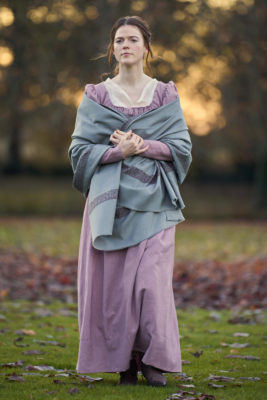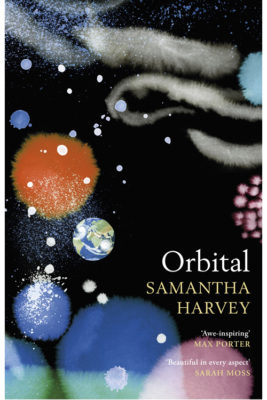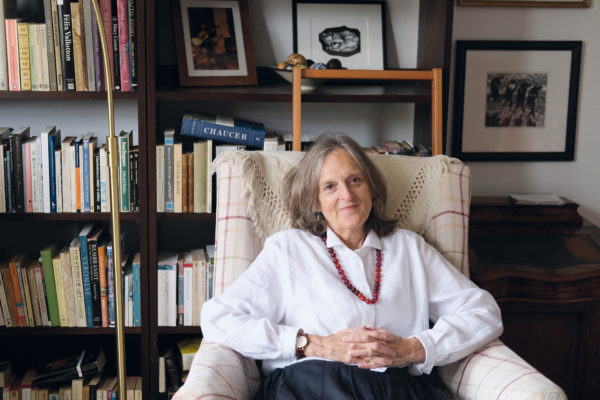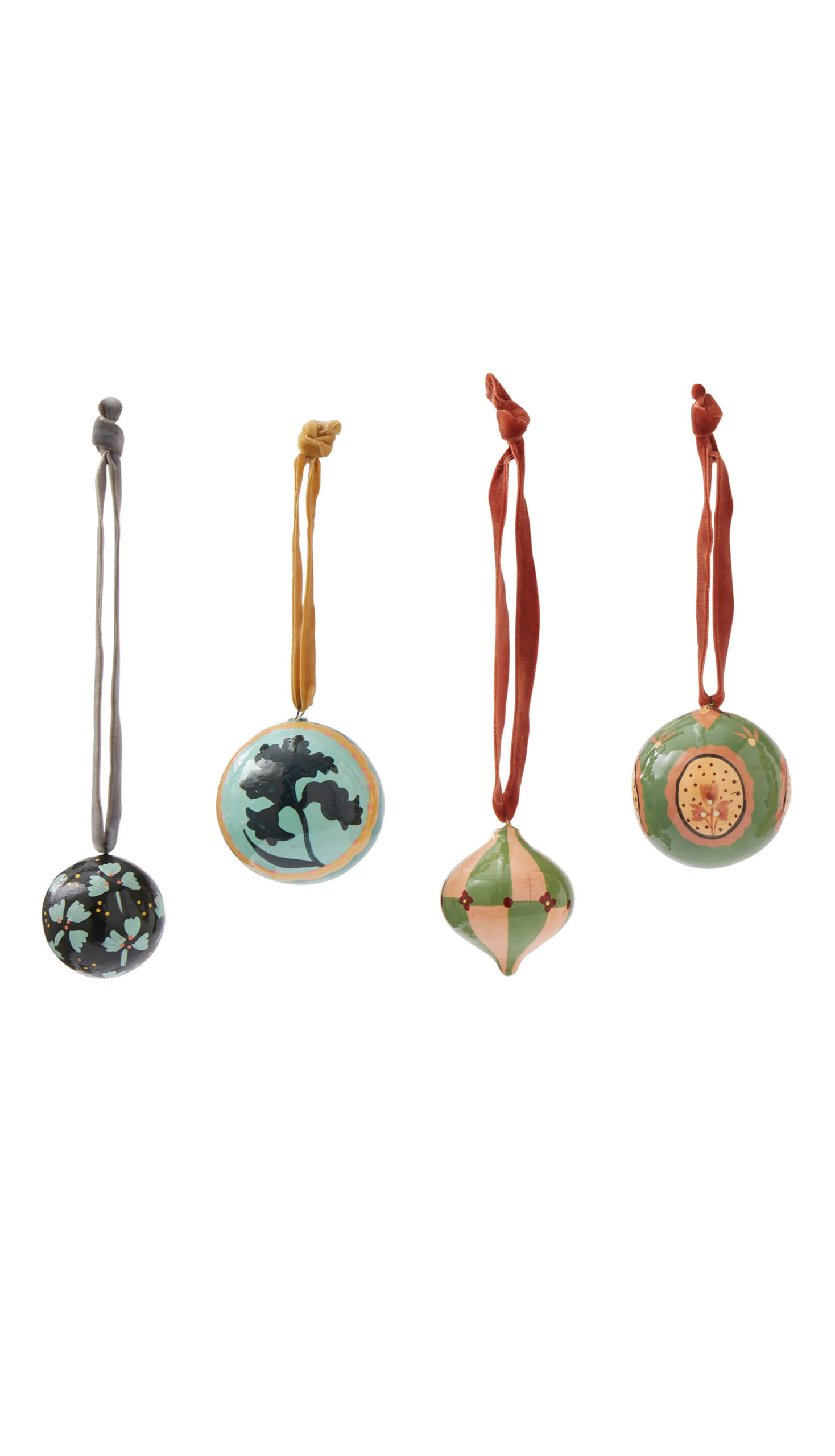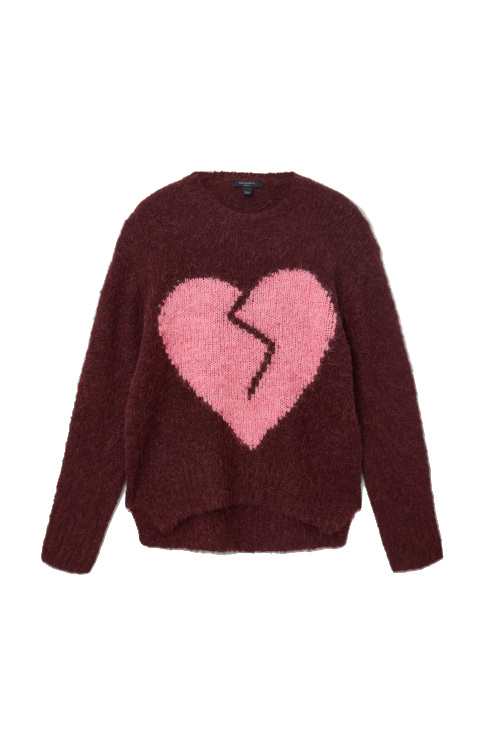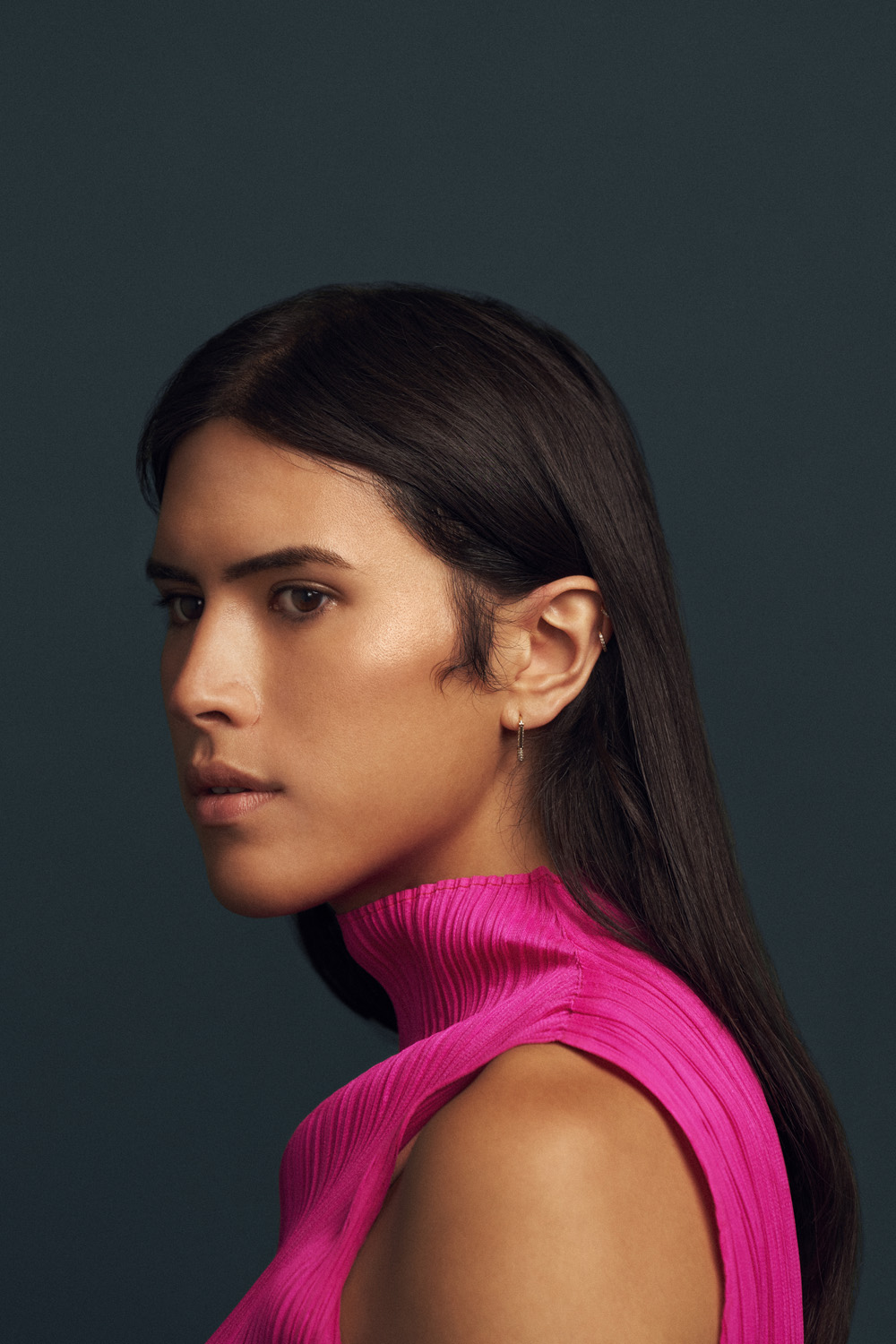
Nicola Dinan: ‘I Hope My Writing Always Speaks To Something Very Human’
By
1 year ago
Nicola is nominated for the Polari First Book Prize
‘It always just feels nice to be recognised,’ says Nicola Dinan, who is on the shortlist for the Polari First Book Prize alongside Munroe Bergdorf, Rachel Dawson, Joshua Jones and more – a prize which was bagged by Jon Ransom last year and Julia Armfield the year before. Ahead of the winner’s big reveal this Friday (29 November), Olivia Emily sat down with Nicola to talk all things Bellies, as well as her follow-up Disappoint Me and delving into sci-fi for book three.
Interview: Nicola Dinan
Hi Nicola, how’s life going at the moment?
I’m doing good. I’ve had a busy week with press things. I’m in a bit of a weird spot where I have a new book coming out in January [Disappoint Me, coming 23 January 2025], but I’m still doing press for Bellies, including because of the Polari Prize. So I’m sort of promoting two books concurrently, which is a new and strange experience. But two books are better than no books!
Your debut novel, Bellies, has been nominated for the Polari First Book Prize. How did it feel when you got the news?
It always just feels nice to be recognised, particularly for a prize that has a very specific vision in uplifting certain stories. And particularly for a book like Bellies, which focuses on trans characters, it feels very special because there aren’t a lot of trans writers in the UK or even globally, who are recognized in mainstream publishing. So it feels just a wonderful opportunity.
Have you read any of the other books on the shortlist?
I have, actually. I’ve read Monroe Bergdorf’s book [Transitional], and I read quite a few in the long list as well, including Liv Little’s book Rose Water, which I really enjoyed. She and I have done a few events in the past where we’ve discussed our books together, so it was really nice to see us both on that initial long list.
How would you describe Bellies to anyone who hasn’t read it?
Bellies starts initially as a boy meets boy. You meet Tom who’s a middle class white boy from South London who loves Mark Fisher, and has these very idealistic, strongly held left wing values. From across the room at a university drag night, Tom sees Ming, who’s all dragged up. Tom is totally beguiled by Ming, and they very quickly fall in love, as you do when you’re in your 20s. But when they move to London to start the next chapter of their lives, Ming comes out as trans – and so suddenly it’s not a boy who meets boy anymore, and they’re forced to reconcile what Ming’s transition means for their relationship.
It was published in 2023 to acclaim. How did the reactions feel?
It definitely felt good… But for the majority of the time I’ve known Bellies as a project, it’s been so private. It’s been something I’ve written in my own home, very cautiously shared with other people, whether that’s with my agent or selected friends. And suddenly it was sort of thrust into the world. The wonderful thing about that is that people can finally read it, but it feels very scary and vulnerable to open yourself to criticism. Whether that criticism is good or bad, that process of making your book a target for any opinion is a scary thing. So it was a real jumble of emotions, of happiness and fear. But a year and a half on, I feel very adjusted to the fact that it’s out in the world, and just really happy when people read it and tell me that they’ve enjoyed it. But even now I have a habit of going on the Goodreads of my own book, which I think is sort of bad behavior from an author. But even seeing people who maybe haven’t loved it and people who have more critical things to say about it, I really do on the whole enjoy reading those things. Having produced something which people can engage with on a critical level is really rewarding. It makes me feel like I’m contributing something to the culture.
You don’t come from a writing background on paper. You studied Natural Sciences at university, then trained as a lawyer. Have you always wanted to be a writer despite all of that?
I think I have. As a teenager, me and my best friend – who’s still one of my best friends today – would send each other bits of creative writing, basically on a weekly basis. But I didn’t know any authors growing up, and I didn’t see it as something that would be possible for myself, so I eventually packed that dream away along with that really lovely process of sending things to my friend to read.
I didn’t revisit it until I maybe reached my mid 20s. By that time I had finished that science degree and then trained and qualified as a lawyer and began practicing in a very corporate law firm. I started to feel as if I had more of a voice and something to say as an adult, and started to really consider not necessarily writing as a career, but writing again. So I started writing short stories, and ended up writing Bellies while I was still working as a lawyer. And in a complete fit of delusion, I quit my job after finishing my first draft of Bellies, because I just had a really good feeling that it was going to work out. And I’m really lucky that I did. Looking back, I just think, ‘oh no, Nicola, you don’t quit your job after the first draft!’. But it was just such an exciting time to reconnect to this part of me which really craved creating things and writing things that felt meaningful, that I’d rejected for over a decade.
Very impressive and very brave! What was the process like after you’d written that first draft?
At that time, I was actually on a workshop run by Faber for aspiring novelists, and when I reached the end of that, only a couple of months later, I was already approaching agents. The agent who I’m with now at the time had said ‘no for now, but please make these changes to the novel’. So I spent two months working furiously, making all the changes that she suggested, and went back to her with a draft, and she took me on. From there, we just edited and edited and sent it out to publishers what would be around a year and a half after I started writing the book. So it all came together really quickly; I hear stories of people writing debut novels over 10 years. I think in my case, it ended up being quicker because I was just really hungry, not only to leave a career that I wasn’t enjoying, but also to really make this book work. I also think some books take as long as they need to write. Bellies is quite a feverish novel, really caught up in the excitement of being young. I think I was quite possessed by that spirit as I was writing, and managed to get through it quite quickly.
Do you remember when you were growing up the kinds of things that you would write? Was it playful, and did it feel like returning to an almost childlike magic?
I actually think when I was younger, I wrote in a really aspirational way. I was trying to imitate the writers that I was reading, and trying to attempt at something that was profound. I didn’t really focus on writing what I knew and what was familiar to me, and I didn’t see much interest in my own life or the circumstances around me. But that writing felt a bit flat – it was often a bit too fantastical, a little bit too verbose.
When I got to the stage in my 20s when I was trying to write again, it was almost more childlike than it was when I initially was writing when I was a teenager, because I really let go of that pressure to imitate any writer beyond myself. I gave myself permission to just write like myself. That’s not to say we shouldn’t aspire for greater things – we absolutely should – with our writing, but I just relaxed a bit. I didn’t feel the pressure to aspire at the profound, but allowed that to work its way into the writing over time.
Your second novel, Disappoint Me, is set to be released in January 2025. Congratulations! Did writing that come with a new sense of pressure, or did you still feel quite free after writing Bellies?
I’m so lucky because I started writing Disappoint Me about three years ago, so I was completely free of the pressures of having had a novel out there in the world. By the time Bellies came out, I had a draft of Disappoint Me that was substantially done. It still required a good deal of editing, but I felt comfortable with it. I was able to use the style I’d created for myself in writing Bellies and carried it over to Disappoint Me, I hope with some growth still, but without the pressure of other people’s expectations for what my work should be. I think that’s why second novels can be so difficult: because people feel as if they’re writing a follow up to, say, a well received novel, whereas I was just writing a follow up to a novel that was going to be published in a couple of years time. It was definitely a freer experience. But then also, you know, you do just carry the experience of writing the first novel into the second. I find that having written a third novel now – that I’m starting the third draft of – I feel much more confident in experimentation and much freer, and that’s grounded in a belief that I can write what I want to write.
I’m sure you can’t give away too much, but can you tease any details about novel number three?
Absolutely! It’s so funny because people always ask that question with the expectation I’ll be really protective over my intellectual property. It always makes me question if I am too loose-lipped about what I’m writing, because I just so freely tell people! The third book is actually a sci-fi novel set in pre-handover Hong Kong in the ‘80s. It’s very loosely drawn from some of my parents’ experiences who met in Hong Kong, and I was born in Hong Kong. It’s sort of colonial sci-fi, written from a post colonial perspective.
That sounds amazing – and coincidentally I was going to ask you about how your education feeds into your writing. In Disappoint Me, Max works in the legal field, and you trained as a lawyer. Did you think your science education would ever feed into your writing? Is that something that you always wanted to do, or something that just came to you?
I think it just naturally comes to me. In my second novel, Max and Vincent are lawyers. Max is also a poet, but law is how she makes her money. And my third book follows two air stewardesses and their barrister husbands. My father was a barrister, I was a lawyer, and I find myself interested in the legal field… I find myself writing about lawyers continually, I think just because I find it interesting. There was a reason I was drawn to it initially – maybe not drawn enough to it to want it as a career, but certainly interested enough in it as a profession, and also the personalities in particular that are drawn to that profession to find it worthwhile writing about.
When it comes to science, in my third year of university, I actually specialised in the history and philosophy of science and moved away from what I’d initially started doing, which was very much the hard sciences. Again, I did that because I was really interested in it – not enough to pursue it thereafter. But in my third novel I’m returning to a lot of those ideas – the philosophy of memory, the philosophy of cognition, theories of personal identity – that I found myself reading about when I was 21 at university. So these things sort of come and go, I think much like people and like friends; some friends move out of your life and come back into it unexpectedly. I also find that with what I write and the themes encoded in what I write.
Is there then another genre that you would love to tackle that you haven’t engaged with yet?
I’m not sure, actually. I’ve started to think about what I might do for a fourth novel, though it sounds very insane that I haven’t even had my second novel come out yet, and I’m already planning number four! For that, I’m thinking about returning to the style in Bellies and Disappoint Me, which is very much relationships-driven. But I think I’m particularly interested in sibling relationships… In Disappoint Me, I sort of explored that a bit through the main character, Max, and her brother, Jamie. But within that novel, there wasn’t quite enough room to fully develop that relationship in the way I could in a separate novel. So I’m thinking of going back to very relationship-driven fiction.
I hope to have a long career in fiction, and I’m hoping that means, somewhere down the line, there’ll be a horror novel! No matter what I write, I hope it always speaks to something very human or deals in very human problems. Genre is a really amazing tool for that; it provides such useful metaphors for human experiences. I certainly found that in writing the third book, which is sci-fi, of course. I hope that will be an ongoing theme in my work, no matter how far I steer into any genre.
Do you have an idea book where you store things you’d like to come back to? How do you know it’s worth pursuing?
So many people around me, when I describe to them my working day, are just like, ‘what does she do all day?’. They’re very bemused by the fact that I spend a lot of my working day walking with headphones in or just sitting at a desk or watching movies. I count that all as productive work, because so much of the testing that comes with an idea is about letting it marinate. I often just sit with an idea, read lots of books, watch movies and allow those inputs to sort of shape that idea, and over time, I decide whether or not it’s worthwhile. The ideas that stick with me are the ones I deem worthy. But the ones I keep returning to in my brain or continue to turn over as I’m going on these walks are the ones that I find I end up writing about.
Are your reading and watching quite varied? Is there anyone that you repeatedly reach to?
I think it is really varied. I obviously have some of my favorite writers: Rachel Cusk, Ben Lerner, James Baldwin. But that’s not really representative of all the fiction that I read. I read quite broadly, and I have quite wide tastes for things like film and television as well. I just started teaching at Royal Holloway only for a short period of time on their creative writing MA. I recently taught a seminar on dialogue, and I actually told the students to watch The Real Housewives. There’s some fantastic dialogue in there, really interesting editing of plot lines, and also just very absurd conversations that still feel very realistic. I think it’s a really good lesson in dialogue for absurdist comedy, but I think they were sort of dumbfounded that that would be my homework for them!
I think inspiration for writing exists everywhere in the world. I don’t set any bar, whether too high or too low, for whether something might actually inspire what I write.
When you sit down and you start writing, are you a planner, or are you someone who dives in and just lets it spill out?
I’m a diver inner. I just cannot plan anything! I often find that the plot points reveal themselves to me as I’m writing. I find that quite nice, because then I sometimes feel as if I’m the characters and I’m making these decisions with them, and the things are happening to me as they’re happening to the characters, because I’m deciding as I’m writing. I often have a sense of roughly where it’s going to start and then roughly where the novel may end, but whatever lies in between always feels up for grabs. Often the end changes as well, because I’ve gone in a direction that has made that initial planned end impossible.
I struggle with character planning as well; I struggle to know who my characters are fully at the outset. I’ve described writing characters as a bit like dating: you don’t know who the characters are from the beginning, and you have to give yourself time to get them to know them. I find as I move through iterations of the novel from draft to draft, I gain this understanding of who a character is and write that into the novel – but that can only be done with time and redrafting, at least for me. So I think planning would have limited use for the way that I write and the way that I understand the characters that I write.
Do you find writing an emotional experience, then, if you’re experiencing the plot along with the characters?
Definitely – and particularly with Bellies. It’s a very nostalgic novel. I started writing it when I was 26, and the novel follows Tom and Ming from when they’re 20 to around 24/25. Rereading it, I feel a lot of their pain, and I often remember what it’s like to write the books and to feel what those characters were feeling, both in terms of reaching into my own experiences, but also just through empathising with what’s on the page.
I definitely find the process quite emotional. I feel a lot of character empathy and connection. I know, obviously, on a logical level, they aren’t real, but I still spend a lot of time thinking, ‘what are Tom and Ming doing now that they might be, say, approaching their 30s?’. I feel as if they’re a part of my life. That’s probably because all my characters are, in some way or another, a function of me. Even though they might seem very different by the time they reach the page, they have to start from me or my experiences – or what I know and what I’ve observed. So I feel a huge emotional tie to them that’s very difficult to let go of.
Are there any writers that really inspire you, or writers you would almost want to write like?
Yeah, I definitely have that. But it’s such a trap, isn’t it? I spent so much time as a teenager trying to write like other writers, and failing. I read things and I’m like, ‘I wish I wrote that’ – but then I always add a dash of caution, like, ‘no, you write how you write, and that’s the platform from which you jump off’. But recently, I read All Fours by Miranda July, and I thought that was such a thoughtful, fun, imaginative novel; I have a lot of admiration for it. Historically, A Visit from the Goon Squad by Jennifer Egan is one of my favorite novels. I love the way she has woven so many different stories together across so many different times; it feels so cohesive, but so moving. She’s such a talented writer, and if you read a bit about how that novel was published – her publisher’s initial, quite small expectations for it, and then how it blew up after – it’s very inspiring as a writer to read her story.
Also Han Kang: I think she’s an incredible writer when it comes to perspective, particularly Greek Lessons, which is about a blind man and a mute woman taking ancient Greek lessons together and how they’re able to communicate and build a relationship. Another writer who I absolutely love is Banana Yoshimoto, who wrote Kitchen and more recently Premonition. Her writing style is extremely poetic. Often it’s very strange in places, and as someone who writes quite heavily realist fiction, at least with Bellies and Disappoint Me, she embodies some of what I’d like to have in my own writing later on – something a little bit more imaginative and maybe without the pressures of being so grounded in reality. When I look across all those authors, there are things I’d like to take from all of them – but I still have to stand in my own style and my own voice, and be very grounded in that.
DISCOVER
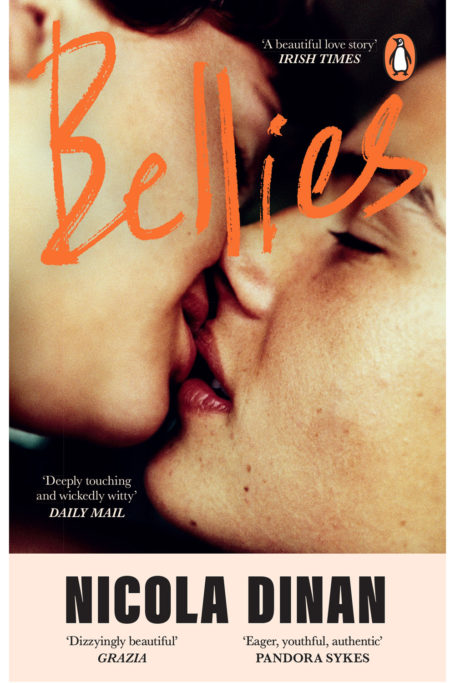
Bellies has been shortlisted for the Polari First Book Prize. Find out more here. The winner will be revealed on Friday 29 November 2024.
Bellies by Nicola Dinan is out now.
Paperback, £9.99
Disappoint Me will be published on 23 January 2025.
Hardback, £16.99.





